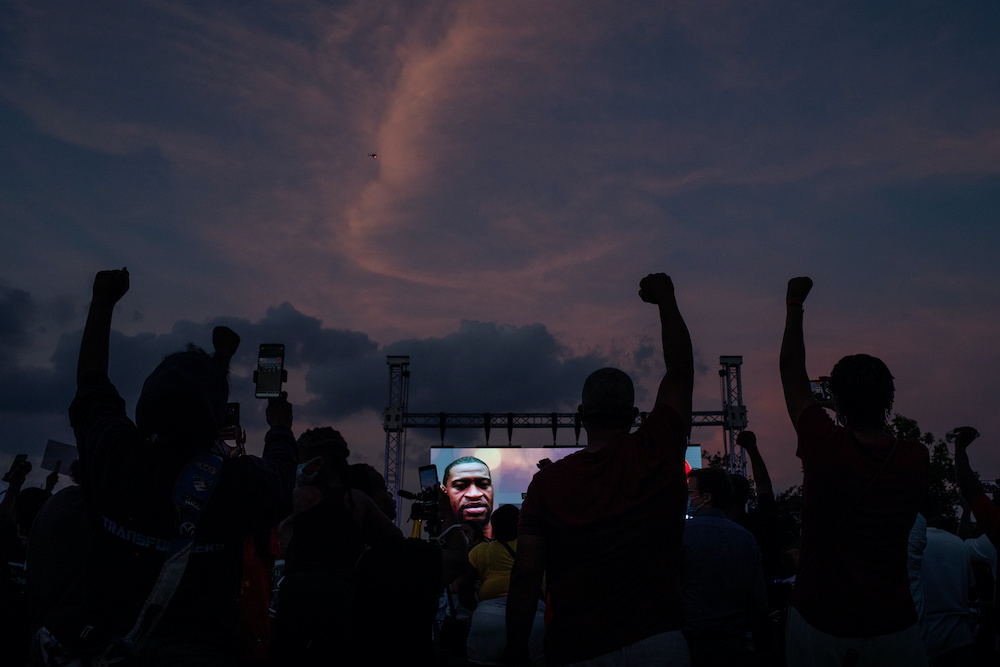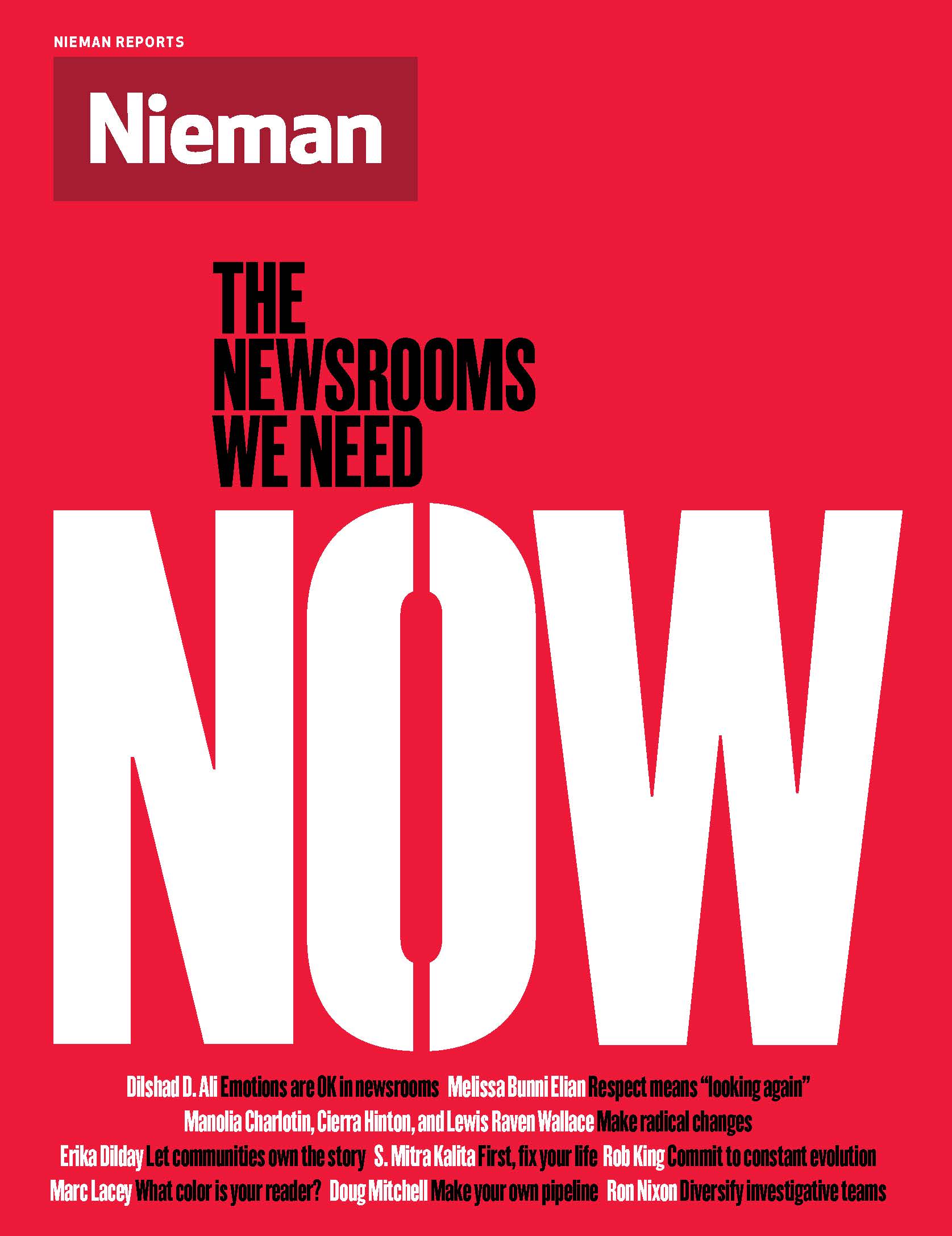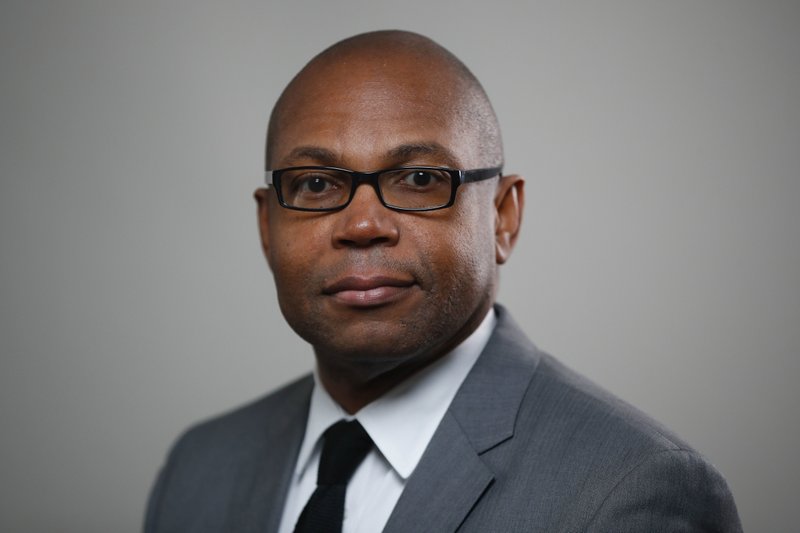
During a June vigil honoring George Floyd, held on the Yates High School field where Floyd played football in Houston, Texas, local residents and alumni raise their hands in solidarity
The killing of George Floyd by police in Minneapolis, Minnesota has created a racial reckoning for the country.
That reckoning has expanded to America’s newsrooms. Across the country, journalists of color have called out their employers for the lack of diversity. News organizations have responded by creating teams of reporters to cover issues of race and inequity across the country.
In numerous cases newsrooms have also created masthead positions to coordinate coverage and increase diversity across the newsroom. These are all good first steps.
But what remains missing in these newsroom changes are concrete steps to diversify investigative teams.
Media surveys done by the American Society of News Editors for years have shown that newsrooms overall remain overwhelmingly white, even in major metropolitan areas where people of color make up a significant number or even a majority of the population.
Comparable surveys for the racial makeup of investigative or project teams at major news outlets have not been done. But anecdotal evidence suggests that they remain overwhelmingly white and male.
There have been some recent hires or promotions at mainstream and nonprofit news outlets which have increased the number of journalists of color in the field of investigative journalism in both management and reporting.
Kimbriell Kelly is investigations editor for the Los Angeles Times Washington bureau. (Kelly was recently named bureau chief of the paper, as of November 4). Marlon A. Walker was recently named investigations/politics editor at the Jackson Clarion Ledger in Mississippi. Denise Smith Amos is the watchdog/accountability editor at the San Diego Union-Tribune.
Patricia Wen made history by becoming the first person of color to lead the legendary Spotlight Team at The Boston Globe.
Dean Baquet, who made his reputation as an investigative reporter when he won a Pulitzer Prize in 1988, is executive editor of The New York Times.
In the nonprofit sector, Susan Smith Richardson was hired as CEO of the Center for Public Integrity, and Matt Thompson was tapped as editor-in-chief of Reveal from the Center for Investigative Reporting. Both are the first African Americans to lead two of the country’s oldest nonprofit investigative news organizations.
Mark Rochester is the editor-in-chief of Type Investigations, a nonprofit newsroom that has done joint investigations with The Guardian, The New York Times Magazine, and others.
Several news organizations now feature young investigative reporters of color as part of their investigative or watchdog teams. Vernal Coleman is an investigative reporter at The Boston Globe. Kat Stafford is an investigative reporter on the Associated Press’s Race and Ethnicity team, and Aura Bogado is a reporter for Reveal from the Center for Investigative Reporting.
Despite these reporters and many others, the overall number of journalists of color in investigative reporting in management or on investigative teams remains abysmally low. The reasons for this are many. In numerous cases, journalists of color aren’t looked at as potential candidates for investigative reporters and aren’t given the opportunity to pursue stories that would give them the chance to show that they can do investigative work.
That was one of the main findings of a survey of members of the Ida B. Wells Society, an organization that I co-founded four years ago to address the lack of journalists of color in investigative reporting.
In addition, the hiring for many investigative jobs, like many jobs in the newsroom, is done through informal networks and groups that often don’t include journalists of color. And in newsrooms, journalists of color are less likely to find mentors who can help guide their careers or create opportunities for them to be investigative reporters.
Several journalism organizations are also trying to address the issue, including established organizations such as the Asian American Journalists Association, the National Association of Hispanic Journalists, the Native American Journalists Association and the National Association of Black Journalists, led by president Dorothy Tucker, an investigative reporter for CBS 2 Chicago.
Investigative Reporters and Editors (IRE), under the leadership of board president Cheryl W. Thompson of NPR and executive director Doug Haddix, also has grown its efforts to diversify the field of investigative reporting.
In recent years, IRE has expanded the number of fellowships and scholarships it offers to journalists of color to attend national conferences and weeklong data boot camps. The organization launched a new yearlong Journalist of Color Investigative Reporting Fellowship and increased the number of journalists of color tapped to speak at conferences and regional workshops.
As I mentioned, the Ida B. Wells Society was created specifically to address the lack of reporters of color in the field of investigative journalism. The society has a number of training programs, fellowships, and mentorships needed to be fully prepared for investigative reporting.
Nikole Hannah-Jones, an investigative reporter for The New York Times Magazine and co-founder of the society, said one of the society’s missions is to “take away the excuse” of many news organizations that they can’t find journalists of color who can be investigative reporters.
Why focus on investigative teams? Investigative reporting plays a crucial role in holding those in power to account. From Watergate to exposés of the Catholic Church, slavery in the seafood industry, the disproportionate killing of African Americans by police, and recent reporting on the Trump administration, just to name a few, investigative reporting has the potential to right wrongs, spark reform, and change lives.
In a nutshell, diversity in newsrooms can’t just be about numbers. While it is important to have journalists of color in the newsroom, just as much, if not more, attention needs to be focused on WHERE they are in the newsroom. As we look to make newsrooms look more like the population at large, it’s important that we don’t forget about investigative teams.
Ron Nixon is global investigations editor at The Associated Press.



